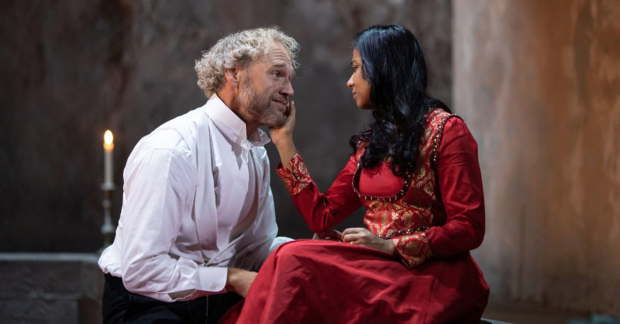Review: A Doll's House (Lyric Hammersmith Theatre)
Playwright Tanika Gupta adapts Ibsen’s classic play

© Helen Maybanks
Nora has become Niru as playwright Tanika Gupta takes Ibsen's study of marital discontent and transposes it to India where an English colonial administrator has taken "a little chirruping Indian skylark" to be his pretty, exoticised bride.
It's a supremely smart switch. Setting the play in 1879, the year it was written, Gupta allows its new Kolkata setting to add a layer of racial domination to its examination of patriarchy and its effects. Ibsen was always about society as well as the individual and here the social structures that pinion Niru in her place are graphically and brilliantly realised.
It helps that Anjana Vasan as Niru really does look like a doll; petite and beautiful she begins the play stealing sweets like a child. Over and over again Elliot Cowan's Tom sweeps her up in his arms, whirling her around like a puppet, depriving her of agency by his ability physically to overwhelm her. The simple disparity in their heights makes her vulnerability all the more touching.
When – in the great final act – the fraud that she committed to raise money to nurse him back to health is finally revealed, he turns on her with the vehemence of man who thinks he is tolerant and is now revealed as a closet racist. As in Robert Icke's adaptation of Schnitzler's The Doctor, the terrible, swirling mix of prejudice uncovered by crisis strengthens Ibsen's central tenet. The moment when he describes her as a "savage heathen" is almost as shocking as his contention she is not fit to look after her children; when the system is built on inequality those outside the power structure will always be in a weak position.
Vasan and Cowan play the scene with total commitment. Her journey from dependence to fierce independence is beautifully charted; she conveys thought in wide-eyed stillness. It's a lovely nuanced performance, marking Vasan as a talent to watch. Cowan is more shouty, but he manages to suggest the weakness that leaves Helmer with just a shred of likeability. At the end of this marriage the door does not slam; there's a suggestion that in leaving it open, Niru also leaves her husband with the possibility of glimpsing a wider world.
It all fits seamlessly into the Indian setting beautifully realised by Lily Arnold's design for a courtyard house with its terracotta walls and a banana tree growing high into the sky; the lighting by Kevin Treacy is atmospheric, matching the mood as much as the changing time of day. Arun Ghosh's onstage musician (playing the music he composed) and Gregory Clarke's sound design both further the sense of a clash of cultures and of ideals. A Kathak dance is a perfect substitution for Nora's famous tarantella; the idea of Niru performing it at a party of white people all the more disturbing.
The secondary changes work equally well. Assad Zaman brings a wheedling sympathy to the role of the blackmailing money-lender, now a struggling clerk; Tripti Tripuraneni is both strong and sad as Niru's friend, a widow forced to wear white and beg for work; Colin Tierney is a sympathetic though slightly sinister Doctor Rank, his fascination for Niru tinged with a forbidden desire. He conveys a general sense of impotence: he despairs at the English imperialists but cannot act.
Rachel O'Riordan, in her first production as director of the Lyric, keeps everything moving along with sensitivity and flair; there are occasional longeurs in the pacing but the production is both faithful to Ibsen and revelatory in its rethinking.
















